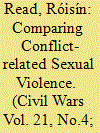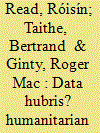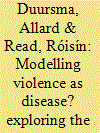| Srl | Item |
| 1 |
ID:
169940


|
|
|
|
|
| Summary/Abstract |
This paper explores knowledge production about sexual violence and highlights the role that comparison, across contexts and between different kinds of knowledge, plays in shaping what we know. It explores the role of strategic knowledge in creating thematic areas of international expertise and draws attention to the roles quantitative evidence and narrative testimony evidence have played in this field of knowledge. The paper addresses the role that comparison plays in producing both quantitative and qualitative data about sexual violence in conflict and considers the functional similarities in the ways these data are deployed to support sexual violence campaigning and advocacy.
|
|
|
|
|
|
|
|
|
|
|
|
|
|
|
|
| 2 |
ID:
146653


|
|
|
|
|
| Summary/Abstract |
This article looks at the promise of technology to revolutionise humanitarian action, especially in terms of the gathering and use of data. With many heralding a ‘data revolution’, the opportunities and enthusiasm for using social media and SMS data in crisis response are on the rise. The article constructs an analytical framework in order to scrutinise the three main claims made on behalf of technologically advanced humanitarian information systems: that they can access data more accurately, more quickly, and alter power relations in emancipatory ways. It does so in relation to two aspects of digital humanitarianism: visual technology and crisis mapping, and big data. The article is partly informed by a historical perspective, but also by interview and other material that suggests some of the claims made on behalf of technology are exaggerated. In particular, we argue that the enthusiasm for the data is vastly outstripped by the capacity to meaningfully analyse it. We conclude by scoping the implications of the future technological evolution of humanitarianism, in particular by examining how technology contributes to what Duffield terms ‘post-modern humanitarianism’.
|
|
|
|
|
|
|
|
|
|
|
|
|
|
|
|
| 3 |
ID:
155686


|
|
|
|
|
| Summary/Abstract |
This article explores the potential and limitations of epidemiological analyses of violence. We draw on an 18-month sample of Joint Mission Analysis Centres data to identify clusters of armed violence in Darfur and model the risk of armed clashes in space and time. We illustrate the merit of using methods from both descriptive epidemiology and analytical epidemiology to study armed conflict. We observe three interesting correlations. Firstly, that violence in one locality means it is more likely that there will be violence in a neighbouring locality in the next month. Secondly, that the presence of peacekeepers in a locality where violence has occurred means it is less likely that violence will occur in a neighbouring locality, than if peacekeepers were not present. Finally, our third observation is that the presence of peacekeepers in a given locality means it is more likely that violence will occur in that locality. Understanding how conflict occurs in space and time could contribute to the effectiveness of peacekeeping missions. This touches upon the major commonality between the efforts of peacekeeping missions and epidemiology: both are fundamentally concerned with the well-being of defined populations and both rely on data to design effective interventions.
|
|
|
|
|
|
|
|
|
|
|
|
|
|
|
|